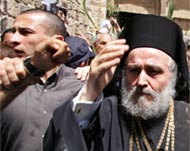Church to decide patriarch’s fate
Orthodox Church leaders have convened to rule on the fate of Jerusalem’s beleaguered Greek Orthodox Patriarch Irineos I.

The patriarch was dismissed from office by his own flock over his alleged involvement in a damaging land-sale scandal.
After a mass to say prayers for spiritual guidance in the discussions, the pan-Orthodox synod – or governing council – on Tuesday gathered under the chairmanship of the head of the Orthodox Church Ecumenical Patriarch Bartholomew I, in the patriarchate’s church on Istanbul’s European side.
Some 42 representatives of 14 sister Churches from Alexandria, Moscow, Georgia, Serbia, Cyprus, Greece, Albania, Poland and elsewhere attended the gathering.
“The meeting is continuing. We will announce the result but I cannot say anything at the moment,” Bartholomew I, the leader of an estimated 250 million Orthodox faithful in the world, told reporters as he left the church for a lunch break.
The gathering, which patriarchate officials say could go on after Tuesday, was expected to be stormy and the outcome was far from certain.
The archbishop of Albania, Anastasia refused to comment on the deliberations, but pointed at the grey cloudy sky over Istanbul when asked about the atmosphere of the meeting.
Time to think
Patriarchate officials have said it is possible the synod would offer Irineos time to think before allowing him to resign or issue a declaration of non-recognition against him.
Irineos, who arrived at the meeting flanked by two bodyguards intends to contest the power of the Istanbul synod and will refuse to resign, according to a source close to the proceedings.
 |
|
Twelve out of eighteen bishops |
One of his two lawyers, who were not allowed entry to the meeting, said they would take the matter to international courts should the synod decide against the patriarch.
“No one can cut us from the religious rights and legal liberties through any legal means,” attorney Franciscos Ragoussis said.
“And any entity that is going to challenge this is going to be brought in front of international justice. By that, we mean the European Court of Human Rights and even the United Nations,” he said.
Irineos was effectively turfed out of office by his own flock on 7 May when 12 out of the 18 bishops in the Holy Synod of the Greek Orthodox Church in Jerusalem voted for his removal.
Under pressure
The patriarch had been under pressure to resign since mid-March when a newspaper reported an alleged multi-million-dollar transaction in which ideologically motivated Jewish businessmen acquired Church land in a mainly Palestinian area of the Old City part of occupied east Jerusalem.
Irineos has repeatedly denied involvement in the sale and has refused to step down.
His supporters claim the Holy Synod in Jerusalem cannot decide on a dismissal unless the patriarch himself calls the meeting, loses his mental capacities or violates the teachings of the Church.
|
“No one can cut us from the religious rights and legal liberties through any legal means” Franciscos Ragoussis, |
His opponents, on the other hand, argue that the Jerusalem Synod acted in the right and expect the Istanbul Synod to endorse its decision.
Six bishops from the Jerusalem Synod who voted for Irineos’s removal, were taking part in Tuesday’s meeting.
“We want our decision to be ratified by the pan-Orthodox Synod. The Church of Jerusalem has a problem but we have already solved it,” the metropolitan of Petra, Cornelios, said.
Protest
The Istanbul Synod meeting also stirred controversy among nationalists in Turkey who contest the power of Bartholomew I recognised by Ankara as only the head of the Greek Orthodox community in Turkey.
Up to 30 demonstrators showed up in front of the patriarchate shortly after the synod began but were blocked by police a few metres from the entrance to the patriarchate.
They dispersed after reading a declaration condemning Bartholomew for setting up a “court independent of Turkish courts” and what they said are his attempts to establish a “second Vatican” in Turkey.